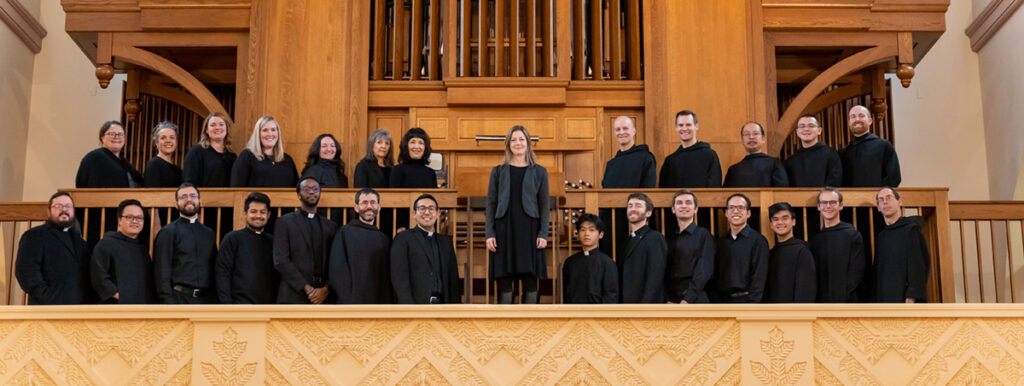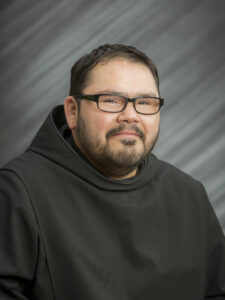 Brother Gregory Benavidez was a really good man and a really good monk.
Brother Gregory Benavidez was a really good man and a really good monk.
In life, he was first of all a good son and brother, nephew, uncle and friend. He was born in Fort Worth, Texas in 1980, the youngest of nine children. He was duly baptized with the name Joshua, or in Spanish, Josué – meaning in Hebrew, “God is deliverance,” a name he was very proud of. Josué was formed by his family relationships, the Mexican American culture and language, the places he grew up in – Texas, North Carolina, Mexico, and Oregon – and the education, life and work experiences that he had over the years. For a time, not unusual these days, his family tried other faith traditions. Eventually his family moved to Salem in 1993. By this time his parents were divorced. Josué found the difficulties of growing up in a broken home with a struggling single mother, along with other challenges he had encountered along the way, a real trial. It was why he often said to those close to him later on, that he understood well the tough circumstances many people go through in life, because he had experienced it first-hand.
His best friend, Brandt, described him as a nerdy kind of fellow, not unlike himself. They became close friends in high school and remained so to this day. They enjoyed Marvel and DC comic books, Batman and Star Wars. Brandt got Br. Gregory his first really good light saber, which he brought out for special occasions when he went into Obi-Wan Kenobi mode. They enjoyed going to Comic Con conventions, being outdoors, swimming in the summer, and just hanging out together.
Josué graduated from high school in 1999. He found his first jobs working in local restaurants. But it was while working in construction with his brother that he found the work he liked best. He enjoyed being outdoors. He was good working with his hands, using small equipment, driving trucks, and the usual banter among workers. Many of the jobs he liked and did best were ones where he could work hard, but still had time with his own thoughts and music in his earphones.
It was around the year 2000 that Josué’s elderly mother, Rose, became frail. Initially, Josué devoted his time to her care, but eventually it became a near full-time job. Rose made the decision to go into assisted living at the facility where she had worked in meal preparation. As a result of a tragic accident and complications, she died in 2002. Her death – and the circumstances around it – were a huge personal blow to Josué.
Rose, however had given him a gift: She shared with her son the deep faith and devotion to God that kept her going and made life possible. She told him over and over again that only God could love him more than she did. With some of those memories to guide him, Josué went back to work, but by 2006 he had begun to move in the direction of the Catholic faith of his Baptism. Because he had not been a practicing Catholic for many years, it was recommended that he join the program for people joining the church, often called RCIA – the Rite of Christian Initiation of Adults. Josué found journeying with other people, learning about the Catholic faith, attending and participating in the liturgy and devotions of the parish, studying the lives of the saints, and preparing for the Easter sacraments a profound and personally moving experience. All of this was a really positive, uplifting, and life-changing time for him. He “re-activated his membership,” as we sometimes call it. He found that God did indeed love him very deeply and personally.
At the Easter Vigil that year, Josué made a Profession of Faith and received the sacraments of Reconciliation, Confirmation, and Eucharist. He got involved with individuals in the wider parish, going to Mass often, and helping out wherever he could.
With the encouragement of folks at St. Joseph Parish in Salem, Josué began in 2008 to come to Mount Angel Abbey for discernment retreats, offered to young men who were thinking about monastic life. In 2009 he entered Mount Angel Abbey to begin his monastic life and journey and made his profession in 2010. During the novitiate years, a novice is thinking about the name he will receive at his first profession of vows. Josué, recognizing his Mexican heritage, was considering the name St. Miguel Pro, who was a Jesuit priest martyred in Mexico in 1927.
But something else intervened. According to a monastic tradition, the first novice to make first profession of vows under a new abbot often receives the 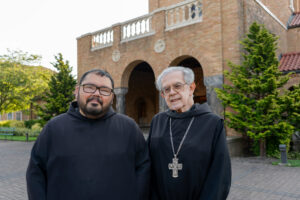 abbot’s name. Br. Gregory was the first in his group to make profession under Abbot Gregory, hence they share the name. Br. Gregory said of this later that he was “deeply honored to be named after this great saint, Saint Gregory the Great, who has done so much for our beautiful Church and for the monastic tradition.” He said he was also grateful to share the same name as Abbot Gregory, who helped him in so many ways as novice master during his formation and in personal meetings.
abbot’s name. Br. Gregory was the first in his group to make profession under Abbot Gregory, hence they share the name. Br. Gregory said of this later that he was “deeply honored to be named after this great saint, Saint Gregory the Great, who has done so much for our beautiful Church and for the monastic tradition.” He said he was also grateful to share the same name as Abbot Gregory, who helped him in so many ways as novice master during his formation and in personal meetings.
Listen is one of the first and most important words in the Rule of St. Benedict. Seeking God is the criterion St. Benedict uses for someone entering the monastery. It is seeking God and listening to the voice of God calling us on a daily basis, in the context of a community of brothers, the Rule, and the Abbot, that is at the heart of our lives. Our lives of prayer and work support this calling. Br. Gregory enjoyed life in community and with his brothers, being faithful to his assignments and chores, but always in a quiet and unobtrusive way.
In his monastic life, Br. Gregory was seeking God in the community of brothers, in common prayer, in our common life, and especially in the two works with which he was primarily occupied: sacristan and the guesthouse. He loved the whole aspect of preparing the vessels for the altar and setting out the vestments and books for Mass. He assisted guest priests and monks to help them celebrate Mass with us. He often worked hard and quietly, almost out of sight. We heard recently stories from guests about how Br. Gregory would give them impromptu tours around the Hilltop. In the church, he would explain the relics of saints to visitors and then patiently answer questions.
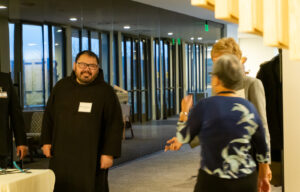 Br. Gregory took to heart St. Benedict’s instruction that, “all guests who arrive shall be received as Christ.” He did all of the following small but essential duties in the guesthouse each week for almost the last 10 years: vacuuming and setting up and tearing down the two large conference rooms, often sometimes several times a week, filling, loading and unloading laundry bins containing all the bedding and towels for 40 rooms, going to and from the laundry, sometimes twice a week, putting garbage and recycling bins out each Wednesday, assisting housekeepers with vacuuming hallways and the dining room, and in a pinch, helping them prepare rooms between one group and the next. He also could be counted on to set up and tear down tables and chairs for banquets and socials. In the Visitation Garden, Br. Gregory would water and weed flower beds and clean and maintain the water feature. He maintained the terraces and the roof-top terrace herb garden, and made pots of coffee and provided ice water for guests – on most mornings before 6 am as well as during the day. And those are just the works I can readily remember! Br. Gregory did them faithfully and thoroughly.
Br. Gregory took to heart St. Benedict’s instruction that, “all guests who arrive shall be received as Christ.” He did all of the following small but essential duties in the guesthouse each week for almost the last 10 years: vacuuming and setting up and tearing down the two large conference rooms, often sometimes several times a week, filling, loading and unloading laundry bins containing all the bedding and towels for 40 rooms, going to and from the laundry, sometimes twice a week, putting garbage and recycling bins out each Wednesday, assisting housekeepers with vacuuming hallways and the dining room, and in a pinch, helping them prepare rooms between one group and the next. He also could be counted on to set up and tear down tables and chairs for banquets and socials. In the Visitation Garden, Br. Gregory would water and weed flower beds and clean and maintain the water feature. He maintained the terraces and the roof-top terrace herb garden, and made pots of coffee and provided ice water for guests – on most mornings before 6 am as well as during the day. And those are just the works I can readily remember! Br. Gregory did them faithfully and thoroughly.
When I was not available as Guest Master or we were very busy with groups, Br. Gregory was attentive to individual guests, especially if he sensed that someone was dealing with something painful. He often sat with guests at meals, talking with them. What I found was really quite beautiful is that, even though Br. Gregory had many difficulties and challenges in his own years growing up, he seemed to want to make sure others didn’t suffer what he did. It was one of the aspects of his ministry in the guesthouse that was always done with great simplicity, kindness, and gentleness. Nothing flashy, just genuine care and concern, offering what he could to help.
Br. Gregory was a shy person by nature and temperament. He found large groups tough to navigate, but in the last month of his life, when he was appointed Assistant Guest Master, he would lead the prayer at lunch and help with checking guests in. He was also learning the computer for reservations and room assignments. It wasn’t always easy for Br. Gregory to form deep relationships or friendships, but once formed, Br. Gregory was a fiercely loyal friend to be treasured.
Br. Gregory was especially close to the guesthouse staff and volunteers, particularly those with whom he worked each day. The kitchen staff came to love him and made sure he had corn tortillas in the fridge. Br. Gregory would often make tacos as an alternative to whatever was served.
Br. Gregory remembered birthdays and special occasions of his family and friends. He sometimes sent rap-like video greetings to his family. When he wrote notes to monastic superiors, either asking for a permission to do something or go somewhere, there was always a kind sentence or two of appreciation, and the word thanks.
As I come to the end of these reflections on Brother Gregory’s life, I am struck by special characteristics or virtues that were consistent and remain as inspiration and lessons for us. In particular, I recall his strong, deep love of God that came from his mother and was furthered by his own personal commitment to his faith and his monastic life. He had a clear sense of duty and felt the need to come through for others in his prayer and in his work. I recall his love and loyalty in friendships and in personal dealings with community members, family, friends and co-workers, his kindness in reaching out to others, and his great sense of humor and light-heartedness as demonstrated in his nerdy collection of comic books and his love of Batman, light sabers, and weird and scary movies. Abbot Gregory put it best in writing about Brother Gregory in the printed obituary: “Brother Gregory was a big man with a very tender heart.”
We will all miss you very much, Brother Gregory. You have our love and promise to pray for you often because of how you touched our lives. And now we commend you to the loving mercy of God, that you may enjoy eternal life with all your confreres, family members, and friends who have gone before you.
– Fr. Philip Waibel, OSB
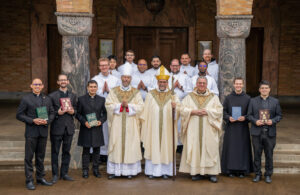 Five seminarians from Mount Angel received the ministry of lector and nine seminarians received the ministry of acolyte on March 22, in the church of Mount Angel Abbey. Bishop Jeffrey M. Fleming, of the Diocese of Great Falls-Billings, installed the lectors and acolytes. Bishop Fleming is a graduate of Mount Angel Seminary, having received his master’s degree in theology in 1992. During the homily, Bishop Fleming encouraged the seminarians to hear how the Lord is calling them through these ministries of lector and acolyte. “God is calling you by name. God has chosen you. Will you allow God to call you to new ministry, to new life?” asked Bishop Fleming.
Five seminarians from Mount Angel received the ministry of lector and nine seminarians received the ministry of acolyte on March 22, in the church of Mount Angel Abbey. Bishop Jeffrey M. Fleming, of the Diocese of Great Falls-Billings, installed the lectors and acolytes. Bishop Fleming is a graduate of Mount Angel Seminary, having received his master’s degree in theology in 1992. During the homily, Bishop Fleming encouraged the seminarians to hear how the Lord is calling them through these ministries of lector and acolyte. “God is calling you by name. God has chosen you. Will you allow God to call you to new ministry, to new life?” asked Bishop Fleming.
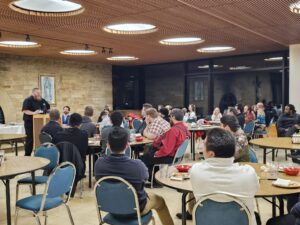
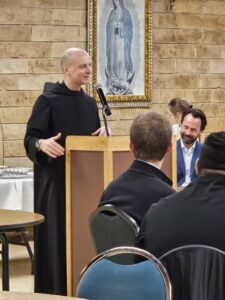
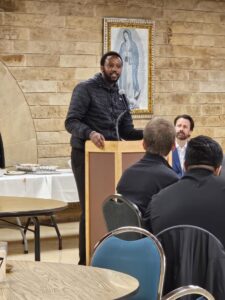
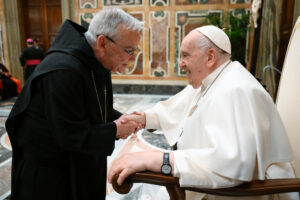 Abbot Jeremy traveled to Rome in early February to participate in a plenary assembly of the Dicastery for Divine Worship. Those in attendance included cardinals, archbishops, and bishops from around the world. One of 3 main speakers at the plenaria, Abbot Jeremy spoke about the curriculum at Mount Angel Seminary, which is centered on Communion Ecclesiology and emphasizes the liturgical formation of seminarians.
Abbot Jeremy traveled to Rome in early February to participate in a plenary assembly of the Dicastery for Divine Worship. Those in attendance included cardinals, archbishops, and bishops from around the world. One of 3 main speakers at the plenaria, Abbot Jeremy spoke about the curriculum at Mount Angel Seminary, which is centered on Communion Ecclesiology and emphasizes the liturgical formation of seminarians.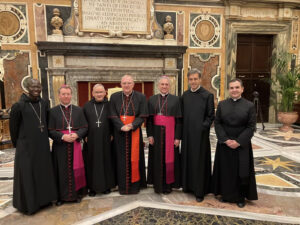
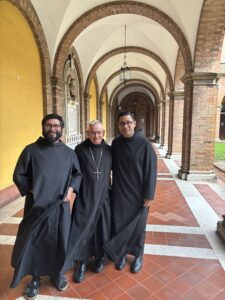
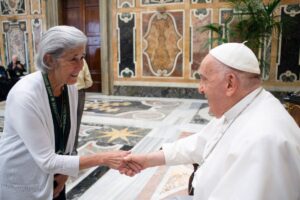
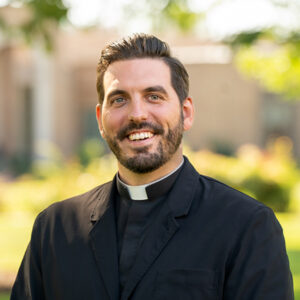 “I just love the priesthood,” shares Fr. Niemczak. “To be in a place that tries to teach future priests what the priesthood is all about, that was exciting for me.” Fr. Niemczak arrived at Mount Angel Seminary in July 2023 and currently serves as the coordinator of the propaedeutic stage of seminary formation. That means he works with the men new to seminary life, whether they are right out of high school or have already completed college and had a career.
“I just love the priesthood,” shares Fr. Niemczak. “To be in a place that tries to teach future priests what the priesthood is all about, that was exciting for me.” Fr. Niemczak arrived at Mount Angel Seminary in July 2023 and currently serves as the coordinator of the propaedeutic stage of seminary formation. That means he works with the men new to seminary life, whether they are right out of high school or have already completed college and had a career. Brother Gregory Benavidez was a really good man and a really good monk.
Brother Gregory Benavidez was a really good man and a really good monk. abbot’s name. Br. Gregory was the first in his group to make profession under Abbot Gregory, hence they share the name. Br. Gregory said of this later that he was “deeply honored to be named after this great saint, Saint Gregory the Great, who has done so much for our beautiful Church and for the monastic tradition.” He said he was also grateful to share the same name as Abbot Gregory, who helped him in so many ways as novice master during his formation and in personal meetings.
abbot’s name. Br. Gregory was the first in his group to make profession under Abbot Gregory, hence they share the name. Br. Gregory said of this later that he was “deeply honored to be named after this great saint, Saint Gregory the Great, who has done so much for our beautiful Church and for the monastic tradition.” He said he was also grateful to share the same name as Abbot Gregory, who helped him in so many ways as novice master during his formation and in personal meetings. Br. Gregory took to heart St. Benedict’s instruction that, “all guests who arrive shall be received as Christ.” He did all of the following small but essential duties in the guesthouse each week for almost the last 10 years: vacuuming and setting up and tearing down the two large conference rooms, often sometimes several times a week, filling, loading and unloading laundry bins containing all the bedding and towels for 40 rooms, going to and from the laundry, sometimes twice a week, putting garbage and recycling bins out each Wednesday, assisting housekeepers with vacuuming hallways and the dining room, and in a pinch, helping them prepare rooms between one group and the next. He also could be counted on to set up and tear down tables and chairs for banquets and socials. In the Visitation Garden, Br. Gregory would water and weed flower beds and clean and maintain the water feature. He maintained the terraces and the roof-top terrace herb garden, and made pots of coffee and provided ice water for guests – on most mornings before 6 am as well as during the day. And those are just the works I can readily remember! Br. Gregory did them faithfully and thoroughly.
Br. Gregory took to heart St. Benedict’s instruction that, “all guests who arrive shall be received as Christ.” He did all of the following small but essential duties in the guesthouse each week for almost the last 10 years: vacuuming and setting up and tearing down the two large conference rooms, often sometimes several times a week, filling, loading and unloading laundry bins containing all the bedding and towels for 40 rooms, going to and from the laundry, sometimes twice a week, putting garbage and recycling bins out each Wednesday, assisting housekeepers with vacuuming hallways and the dining room, and in a pinch, helping them prepare rooms between one group and the next. He also could be counted on to set up and tear down tables and chairs for banquets and socials. In the Visitation Garden, Br. Gregory would water and weed flower beds and clean and maintain the water feature. He maintained the terraces and the roof-top terrace herb garden, and made pots of coffee and provided ice water for guests – on most mornings before 6 am as well as during the day. And those are just the works I can readily remember! Br. Gregory did them faithfully and thoroughly.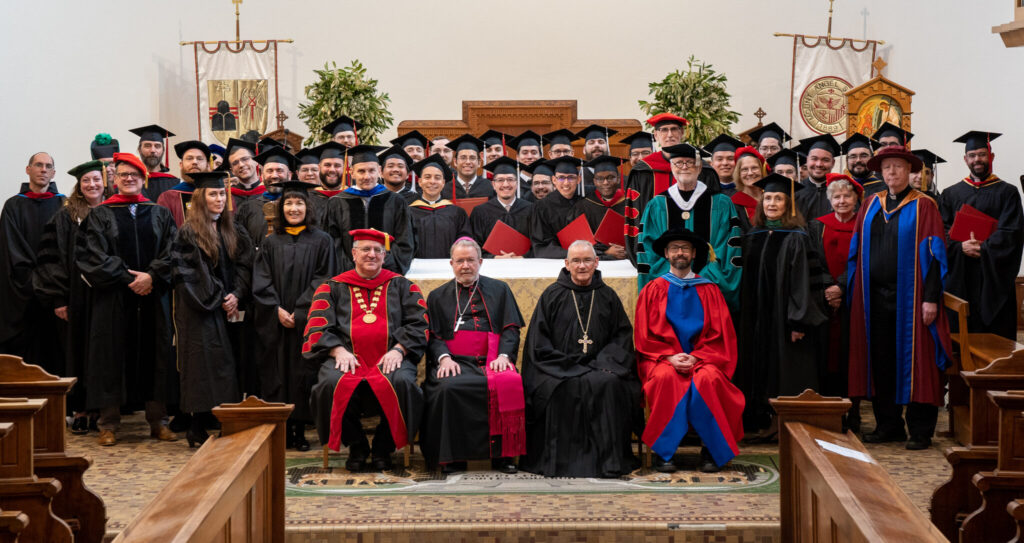
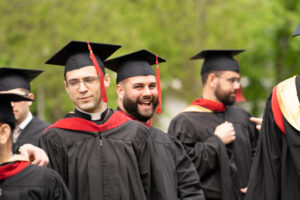 During the Senior Farewell address, Deacon Marc Gandolfo of the Diocese of San Diego reflected on the centrality of the Eucharist in his experience of seminary formation. He shared that “in the same way that in the Mass, the gifts are transformed into the Body and Blood of Christ, so we have been forever changed by our time spent here at Mount Angel.”
During the Senior Farewell address, Deacon Marc Gandolfo of the Diocese of San Diego reflected on the centrality of the Eucharist in his experience of seminary formation. He shared that “in the same way that in the Mass, the gifts are transformed into the Body and Blood of Christ, so we have been forever changed by our time spent here at Mount Angel.”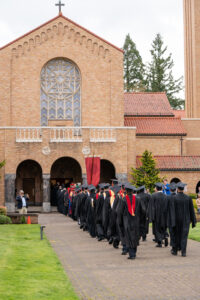
 Bishop Vann reminded the graduates that we don’t always see clearly or understand the purpose of the present moment in the broader picture of life. But, from his own experience, he has found that in the providence of God, what life presents today is the best preparation for tomorrow. Most importantly, the people we find ourselves with today form the community that will carry us through to whatever the next step is.
Bishop Vann reminded the graduates that we don’t always see clearly or understand the purpose of the present moment in the broader picture of life. But, from his own experience, he has found that in the providence of God, what life presents today is the best preparation for tomorrow. Most importantly, the people we find ourselves with today form the community that will carry us through to whatever the next step is.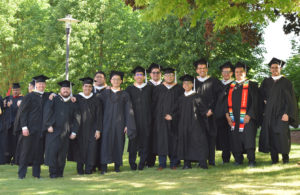
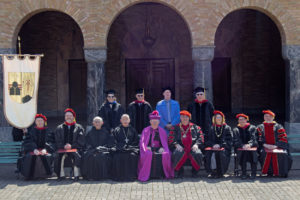
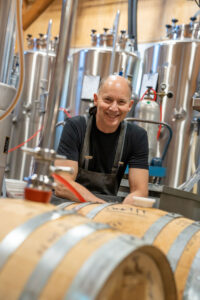 In preparation for the Saint Benedict Festival on July 8, 2023, Fr. Martin Grassel, OSB, general manager at the Benedictine Brewery, has been hard at work cultivating the craft of barrel-aged beer. As the name suggests, barrel-aging is the process by which a beer is stored in a wooden barrel for a time, absorbing the flavors of the wood and the previous contents of the barrel. At the festival, the brewery will debut four beers that have been aging in bourbon barrels: Dark Night, St. Rafael, St. Gabriel, and Black Habit.
In preparation for the Saint Benedict Festival on July 8, 2023, Fr. Martin Grassel, OSB, general manager at the Benedictine Brewery, has been hard at work cultivating the craft of barrel-aged beer. As the name suggests, barrel-aging is the process by which a beer is stored in a wooden barrel for a time, absorbing the flavors of the wood and the previous contents of the barrel. At the festival, the brewery will debut four beers that have been aging in bourbon barrels: Dark Night, St. Rafael, St. Gabriel, and Black Habit.